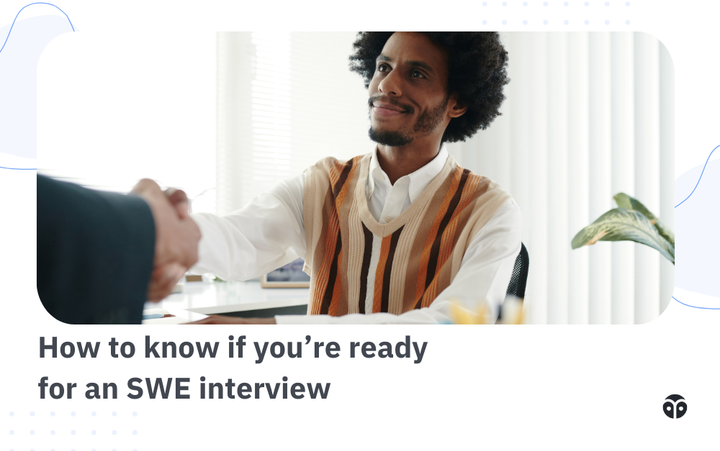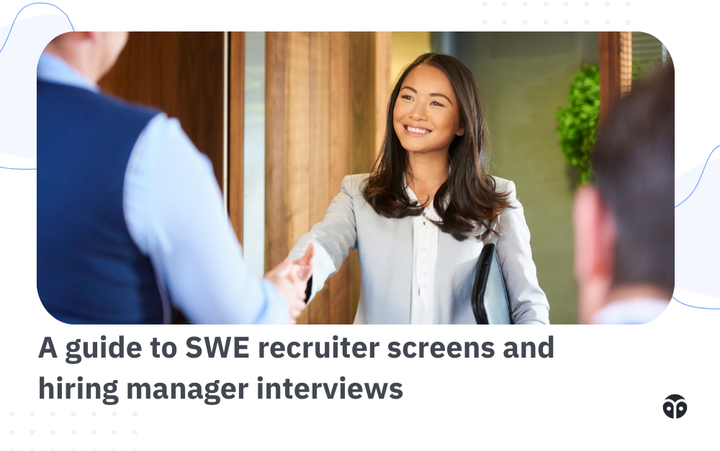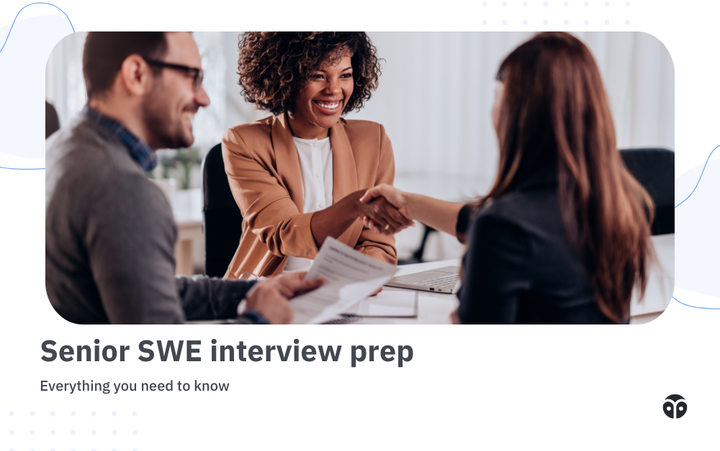Be prepared to answer these common behavioral interview questions in your next SWE interview
A list of common interview questions that cover personal background, job interest, teamwork, problem-solving, and even compensation expectations.

In a software engineering interview, technical skills are only one part of the picture.
Companies want to know if you’re a good fit beyond the code you write, so they ask a wide range of questions—including insights about your career path, strengths, and how you handle real-world challenges. To help you prepare, here’s a list of common behavioral interview questions that cover personal background, job interest, teamwork, problem-solving, and even compensation expectations.
Each question category has its own purpose, whether it’s evaluating your technical fit, understanding your career goals, or seeing how you handle tough situations.
Here’s a list of the most common interview questions for software engineers, why it matters, and how to tackle each type of question.
1. Personal and career goals
These questions let interviewers get to know your career journey, motivations, and what you’re aiming for:
- Tell me about your current role.
- What’s one potential you haven’t fully explored yet?
- How did you first learn software engineering or iOS development?
- Why do you want to make a job change, and why now?
- Where would you like to be in 5 years?
- What are you looking for in your next position?
- How would others describe you?
- What’s the riskiest choice you’ve made, and what happened?
- What’s something important you learned in your current role?
2. Interest in the company and role
Here, interviewers want to see if you’ve done your research and genuinely want this job:
- Why should we hire you?
- What interests you about working here?
- What do you know about our company?
- What do you know about this position?
- Why are you drawn to this specific role?
- Can you walk me through your previous roles?
3. Product knowledge
These questions assess your understanding of the company’s product and your critical thinking skills:
- What’s one thing you’d improve about our product and why?
- What’s something you think our product does well?
- How would you explain our product to someone who hasn’t used it?
4. Handling challenges and weaknesses
Every engineer faces obstacles and setbacks. These questions help interviewers understand how you approach difficult situations:
- Can you tell me about a time you aimed for something and didn’t succeed?
- What was the hardest project you worked on, and what did you learn?
- Have you missed a deadline, and how did you handle it?
- How do you respond to unexpected changes in projects?
- What’s a skill you’re working to improve?
- How do you prioritize when there’s a lot on your plate?
- Tell me about a decision you made that wasn’t popular.
- What’s the biggest mistake you’ve made, and what did you learn from it?
5. Teamwork and collaboration
Here, interviewers explore your ability to communicate, solve problems, and contribute to a team:
- Do you prefer working alone or in a team?
- How do you stay productive?
- Describe a time when you worked with someone with different work habits.
- Tell me about a time you had a disagreement with a teammate. How did you handle it?
- How do you approach conflict in a team?
- Describe a time you led a team with challenges.
- Tell me about a time when you influenced someone’s opinion.
6. Strengths and motivation
These questions help interviewers understand your key strengths and what drives you to do your best work:
- Tell me about a time you went above and beyond.
- How do you ensure high quality in your work?
- What is something you’re particularly strong at?
- Describe a time you took initiative on a project.
- Tell me about a time you had to quickly learn something new.
7. Key accomplishments
These questions focus on your past successes and allow you to showcase your technical abilities and impact on projects:
- What’s a project you’re most proud of?
- What have you been working on recently?
8. Problem solving and self-awareness
These questions are about how you approach problems, make decisions, and reflect on your experiences:
- How do you approach problem-solving?
- Describe a time when you had to make a quick decision.
- Can you give an example of when you spotted a potential issue and addressed it early?
- How do you stay organized?
- How do you communicate your ideas and opinions to others?
9. Experience and past projects
These questions dive into your technical background and how well your past experiences fit the role:
- What languages are you proficient in?
- What experience do you have with [specific language or technology]?
- Can you walk me through your experience on your resume?
- Tell me about some of your past projects.
10. Practicalities and compensation
Finally, logistical questions help align expectations on timing, other interviews, and compensation:
- Are you interviewing with other companies?
- What are your salary expectations?
- When would you be able to start?
Prepping for a well-rounded interview
By preparing thoughtful, real examples that highlight your strengths, resilience, and motivations, you’ll stand out as a well-rounded candidate. Tackle each question with confidence and authenticity, and you’ll leave interviewers with a clear picture of how you’ll bring value to their team.
Good luck!
Get holistic behavioral interview question prep with Formation
The Formation Fellowship gives mid-level and senior engineering job seekers everything they need to land their dream roles—including personalized skill brush-ups, resume help, unlimited mock interviews with experienced software engineers and hiring managers from top-tier tech companies, career and negotiation support, and more.
If you’re having trouble navigating your job search on your own, apply here and get unconditional support from a team of engineering mentors, technical recruiters, career coaches, and more.



